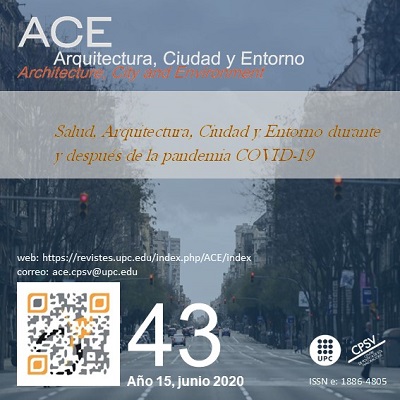In Defense of the City: From Lock-down Dystopia to Open Cities
DOI:
https://doi.org/10.5821/ace.15.43.9518Keywords:
urban planning, city, density, public spaceAbstract
COVID-19 has deeply destabilised the city's basic infrastructures and its public space, prompting possible disruptive trends regarding the conventional image of the city. Density is associated with the notion of intensity. The intensity in social interaction is key to innovation and creativity in science, culture, and the economy. From an environmental point of view, density is crucial for the reduction of the urban footprint and lowering energy consumption and carbon emissions. One of the most urgent challenges that cities face is solving the contradiction between densification, understood as putting a rational limit to land use, and disperse growth, which in the context of the COVID-19 pandemic seems better suited for social distancing. Social-distancing measures during the COVID-19 health emergency have stressed the importance of linkages between individuals and different groups. Moreover, they have highlighted the advantages of living in places where access to essential services is within walking distance, as well as the collateral benefits of mobility reduction. On the other hand, the conflict between road space, designed solely for the car, and spatial requirements for pedestrian mobility, as well as for economic activities at street level, has become ever more evident. Our productive homes, where work activity, family care, social connection, and personal intimacy have coexisted during the lock-down, are the forerunners of a deep transformation in residential architecture. In order to manage present-day urban complexity, it is not enough to plan or design the city which we can see. But the deepest change must take place in a renovation of the dialectics between the public and private spheres, incorporating both social and temporal dimensions into the spatial plans for the city.
Downloads
Published
Issue
Section
License
| INTELECTUAL PROTECTION CRITERIA |
At this moment, it is count with the "Oficina Española de Patentes y Marcas", while global protection it is being processed by the World Intelectual Property Organization (OMPI/WIPO). Nevertheless the International Standard Serial Number Office (ISSN) has given the following numbers ISSN: 1886-4805 (electronic version) and 1887-7052 (paper version). All articles will be peer reviewed, using double blind reviewing. |
| COPYRIGHT |
The article contents and their comments are authors exclusive liability, and do not reflect necessarily the journal editor commitee's opinion. All ACE published works are subject to the following licence CC BY-NC-ND 3.0 ES http://creativecommons.org/licenses/by-nc-nd/3.0/es/ It implies that authors do not hold nor retain the copyright without restrictions but only those included in the licence. |





































